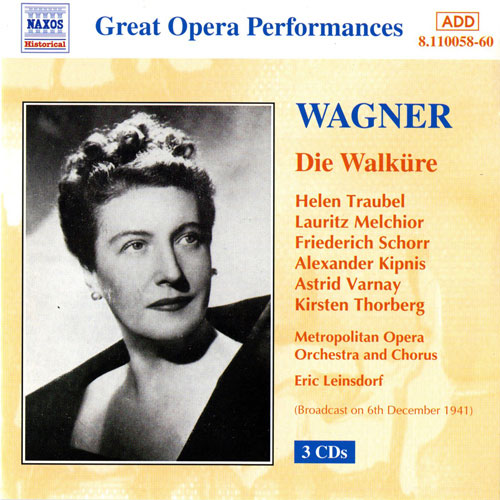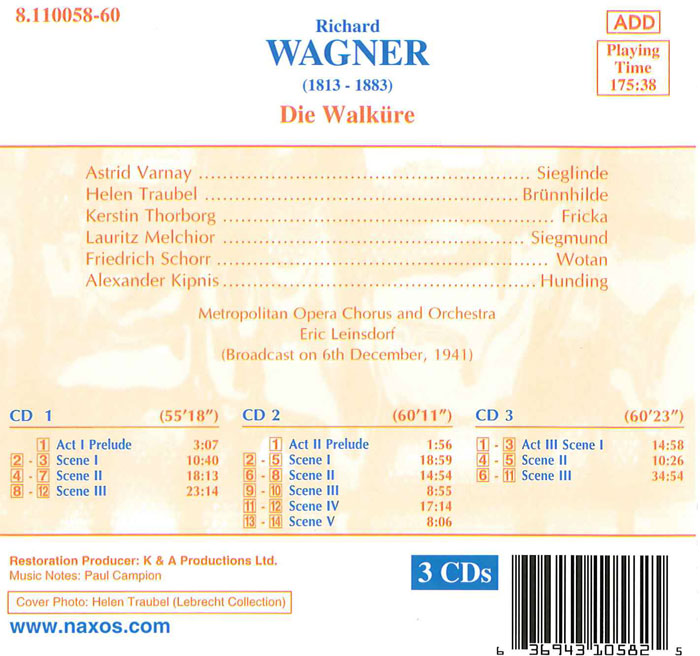Logowanie
Dziś nikt już tak genialnie nie jazzuje!
Bobby Hutcherson, Joe Sample
San Francisco
SHM-CD/SACD - NOWY FORMAT - DŻWIĘK TAK CZYSTY, JAK Z CZASU WIELKIEGO WYBUCHU!
Wayne Shorter, Freddie Hubbard, Herbie Hancock, Ron Carter, Elvin Jones
Speak no evil
UHQCD - dotknij Oryginału - MQA (Master Quality Authenticated)
Chesky! Niezmiennie perfekcyjny
Winylowy niezbędnik
ClearAudio
Double Matrix Professional - Sonic
najbardziej inteligentna i skuteczna pralka do płyt winylowych wszelkiego typu - całkowicie automatyczna
WAGNER, Helen Traubel, Lauritz Melchior, Astrid Varnay, Erich Leinsdorf
Die Walkure

Penguin Guide, January 2009 Recorded live at the Met. in New York in December 1941, the Naxos historical set offers an electrifying performance, starrily, cast, with radio sound giving clear focus to the voices. With Astrid Varnay as Sieglinde making her début at the Met. and Helen Traubel as Brünnhilde also making her début role, it was a great occasion, with Lauritz Melchoir plainly intent on not being outshone. He is in heroic voice, the master Wagner tenor of his generation, daring to hold on to his cries of Walse, Walse’ for extra-ordinary length. Varnay is a warm Sieglinde, producing Flagstad-like overtunes. Equally, Helen Traubel sings with a rock-like firmness that is too rare in latter-day Wagner sopranos, clear and incisive, never fluffing a note. Kirsten Thorborg is a magnificent Fricka, and Alexander Kipnis a thrilling Hunding, with his dark, incisive attack. It is sad that next to these, the other great Wagnerian, Friedrich Schorr, as Wotan, reveals a sadly worn voice, strained and dry on top. It may be as well that his Act II monologue is severely cut. Yet the nobility of his portrayal still comes over powerfully, as in his final half-tone phrase, kissing away Brünnhilde’s godhead. Liensdorf draws incandescent playing from the Met. Orchestra in a performance wilder than his RCA studio account but just as compelling. Alan Blyth Gramophone, May 2001 "Two memorable nights at the opera captured for posterity and each enshrining a cherishable partnership between the incomparable Melchior and a great soprano. At super-bargain priceKthis is an essential purchase for Wagnerians." Jed Distler ClassicsToday.com, January 2001 "This sizzler of a Die Walküre, one of the finest of the opera's many vintage broadcasts from the Met stage, has everything going for it. Let's start with the women. Astrid Varnay was an 11th-hour replacement for the indisposed Lotte Lehmann. Making every word count, Varnay's big voice welds Sieglinde's bottled-up passion and Wagner's urgent lyricism with riveting authority. You'd never know that this inexperienced 23-year-old singer had never before sung on stage. As Fricka, the great mezzo Kirsten Thorborg finds a vulnerable subtext beneath her character's 'morals police' surface. As for Helen Traubel's Brünnhilde, you'd have to look far and wide today for a voice as seamlessly modulated and effortless. What can anyone add to all the praise bestowed upon Lauritz Melchior's honeyed, baritonal Siegmund, in prime voice? Yes, he milks the pair of 'Wälses' in Act 1 to, well, Wagnerian length! And why not? After all, was Rockefeller ashamed of his millions? Alexander Kipnis' statuesque, resplendent Hunding is one of the best on record. Sadly, Friedrich Schorr no longer commands the ringing tone and support that distinguished his pre-war Wotan recordings. "Under Erich Leinsdorf's disciplined baton, the Met Orchestra emerges as an equal character in the drama. The string playing sings with tender inflection, and the most complex scoring is cogently contoured, even at Leinsdorf's sometimes-breakneck tempos. The sound is quite good for an AM radio aircheck--about equal to what HMV's engineers achieved in the late 1920s. Save for a big cut in Wotan's Act 2 monologue, the opera is performed complete. If you're a historic Wagner maven, you'll easily find shelf space for this enticing bargain." Lauritz Melchior (Siegmund), Astrid Varnay (Sieglinde), Helen Traubel (Brünnhilde), Friedrich Schorr (Wotan), Kerstin Thorborg (Fricka) New York Metropolitan Opera and Chorus, Erich Leinsdorf


































